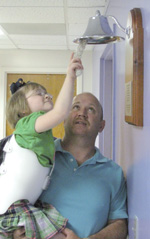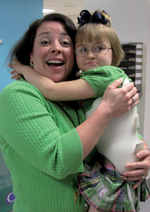|
|

|
After 18 long months of chemotherapy...
Bell rings in hope
|
by Dawn Brazell
Public Relations  Cradled
in her father’s arms, 5-year-old Kendall Hall stretches up to reach the
braided rope of the Survivor’s Bell on the sixth floor of
Hematology/Oncology in Rutledge Tower. Cradled
in her father’s arms, 5-year-old Kendall Hall stretches up to reach the
braided rope of the Survivor’s Bell on the sixth floor of
Hematology/Oncology in Rutledge Tower.
David
Hall helps his daughter Kendall, who just finished 18 months of
chemotherapy, ring the Survivor’s Bell that the family made and donated
to the hospital.
Her mother, Cindy Hall, stops her to read a poem.
“I have no idea how she managed it,” said Hall, who also was diagnosed
with cancer while her daughter was undergoing chemotherapy treatment
for a spinal tumor. Hall, who still was recovering from the shock that
her daughter had cancer, learned her sister’s routine mammogram
revealed cancer. Hall went to get a mammogram just to be safe, and was
shocked to find she also had breast cancer.
They all faced chemotherapy together. For the sisters, it was a matter
of months. For Kendall, though, it stretched to 18 months before her
scans were clear.
A fireball of excited energy, Kendall eyed the bell March 29, waiting
for her turn to ring it as a sign her treatment was done. It has stood
waiting on the hall since it was erected by her family in July 2009.
Her father, David Hall, hand-carved the board and mounted an old ship’s
bell he had salvaged years earlier. When asked why he didn’t wait to
install the Survivor's Bell so Kendall could be the first to ring it,
he shook his head decisively.
“It’s not just ours. There are people who have been through more than we have and need it just as much.”
Today, though, it was Kendall’s turn as family, friends and hospital
staff gathered to celebrate. Hall read the “Survivor’s Cheer” engraved
on the bell’s plaque and commanded her daughter to ring it loud and
proud.
Kendall didn’t have to be told twice. With the last peal fading, her
head dropped onto her father’s shoulder, her typical spirited façade
gone. Instead there rested the vulnerable face of a 5-year-old girl
finally free of the weight of chemotherapy.
Ringing the bell has been a long time in coming. The bell, like the family, has become a symbol of hope.
Facing challenges started at birth for Kendall, who had a wide array of
health issues that worsened as she got older. She was diagnosed with
pilocytic astrocyctoma in November 2007 at age 3 and had to undergo
surgery followed by a month of rehabilitation to relearn to walk.
When life seemed to return somewhat to normal, the tumor came back.
“That’s when the big ‘C’ entered the picture,” said Cindy. “No one had
ever said the word cancer before. It’s rare to have it on the spine,
and I hated to have it come back.”
As Kendall, Hall and her sister, Tammy Dye, faced their battles, David
Hall had his own. David lost a sister to cancer several years ago and
watched his mother successfully battle ovarian cancer last year. Still
adjusting to the news of his wife and daughter’s cancers, he lost his
job. The Halls worried who would take care of the family, but trusted
it would all work out. David started his own business. When Cindy’s
mother, Jean Lookabill, suggested a survivor’s bell, David knew he was
the one to build it. He and his wife felt it was a way to give back.
“MUSC has been so awesome to us, and everyone there has been so
wonderful,” said Cindy. “We wanted to give something back. To the
average person, ringing a bell doesn’t sound all that special, but to
someone going through chemo—when you reach that milestone of finishing
chemo—it means the world to you.”
Recently Kendall was at MUSC getting fluids when another child got to
ring the bell. The child was told that Kendall was in the other room
and asked if she could meet her and thank her. It was a touching moment
for the whole family.
It’s moments such as those that have gotten them through.
 Christina McDaniel, R.N., shares a celebratory hug after Kendall rings the Survivor's Bell. Christina McDaniel, R.N., shares a celebratory hug after Kendall rings the Survivor's Bell.
And it’s the people, said Kendall's mom. It’s a long list, but it
includes such names as R. Bhanu Pillai, M.D., a pediatric
gastroenterologist who thought to scan her daughter’s back leading to
the discovery of the tumor; and Christina McDaniel, R.N., who’s like a
member of their family; and Hall’s parents, Guy and Jean Lookabill, who
have given up retirement to take Kendall to all her weekly appointments.
Their attitudes also have helped. When she and her sister found out
about their cancers, Hall said they decided not to take it as a death
sentence. They learned to find the humor where they could and
celebrated the small successes.
McDaniel, who has become close friends with Cindy, said she’s amazed at
the likeness of mother and daughter. “They have faced so many trials
and setbacks and still continued on with a determination like no
other. She never hesitated in her fight. She takes everything
head on, and Kendall is just like her. We call Kendall Cindy’s mini-me
and nothing could be more true. The bell is such a wonderful
inspiration, just like the family that donated it.”
Though she wears a brace, Kendall raced around after the bell ringing
enjoying cake, gifts and the announcement of a surprise trip to Disney
World. When the family gets back, Kendall finally gets to go to school
fulltime.
Hall, who holds a job as an office manager for a marine wholesale
distributor, will be back to handling collections. She said she has
little patience for people who give her their hardship cases. “I tell
them, ‘Don’t go there with me.’ These are the cards that we were dealt.
This is how we deal with them—one day at a time.”
Friday, April 2, 2010
|
|
|



 Cradled
in her father’s arms, 5-year-old Kendall Hall stretches up to reach the
braided rope of the Survivor’s Bell on the sixth floor of
Hematology/Oncology in Rutledge Tower.
Cradled
in her father’s arms, 5-year-old Kendall Hall stretches up to reach the
braided rope of the Survivor’s Bell on the sixth floor of
Hematology/Oncology in Rutledge Tower.